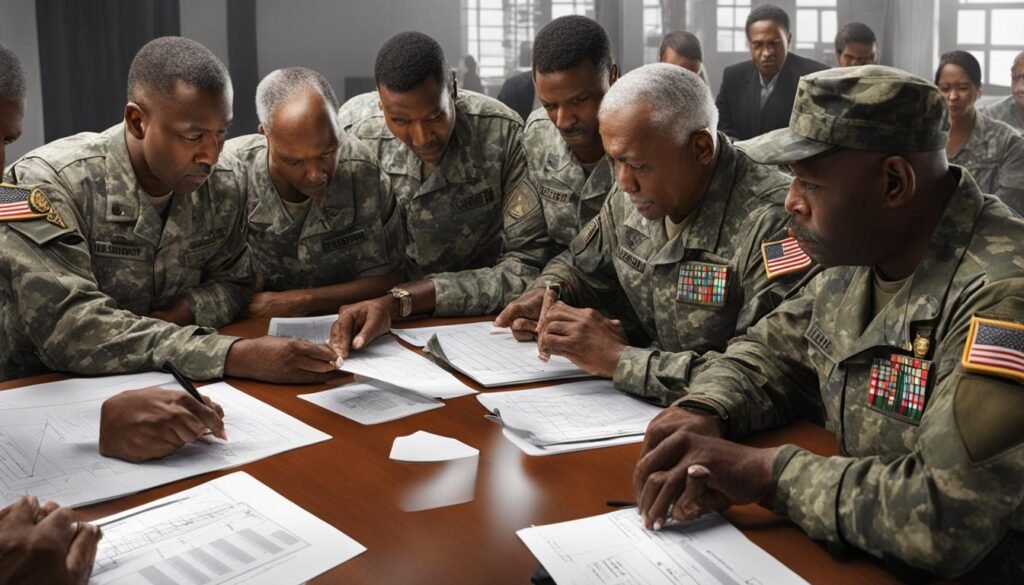When it comes to supporting our veterans, it is crucial to evaluate the effectiveness of the programs designed to assist them. By measuring the success of veteran support services, we can assess the impact these programs have on improving the lives of our brave men and women who have served our country.
Over the past four years, the CDC Foundation has been at the forefront of supporting the Veteran Suicide Prevention Evaluation (VSPE) project. This initiative aims to strengthen the evaluation capabilities of veteran-serving organizations (VSOs) in measuring the effectiveness of programs addressing veteran suicide.
The VSPE project provides funding and support to four VSOs, including the Arizona Coalition for Military Families, America’s Warrior Partnership, Objective Zero Foundation, and The Mission Continues. These organizations will conduct outcome evaluations of their community-based programs to assess their impact on veteran suicide prevention.
Additionally, the project includes a community of practice (COP) where awardees can share knowledge and best practices in evaluation and program development. The CDC Foundation remains committed to building evaluation capacity for veteran-serving organizations and will continue to advance this work through the project.
Key Takeaways:
- Evaluating the effectiveness of veteran support programs is crucial for improving the lives of our veterans.
- The CDC Foundation supports the Veteran Suicide Prevention Evaluation project to strengthen evaluation capabilities of veteran-serving organizations.
- Funding and support are provided to four veteran-serving organizations for outcome evaluations of community-based programs.
- A community of practice (COP) allows for knowledge sharing and best practices in program development and evaluation.
- The CDC Foundation is committed to building evaluation capacity for veteran-serving organizations.
Understanding the Impact of Veteran Support Services

A research study conducted on veteran support services at a Veterans Resource Center found that these services play a crucial role in addressing both the immediate and long-term needs of veterans. The study identified several services that contribute significantly to long-term success, including the Veterans Resource Center, VA benefits certification, library resources, career counseling, and counseling services.
Among the services evaluated, the study found that the use and efficiency of these services were positively associated with higher success scores among student veterans surveyed. This suggests that the utilization of these specific support services can significantly impact the overall success of veteran students. Additionally, the study highlighted the importance of veterans’ willingness to disclose their veteran status to faculty and staff, as it can facilitate access to targeted support services.
The findings from this study emphasize the need for comprehensive evaluation of veteran support programs to ensure their effectiveness in meeting the needs of this unique population. By understanding the impact of specific services, organizations can allocate resources more strategically and tailor their programs to maximize outcomes for veteran students.
“The use and efficiency of veteran support services were positively associated with higher success scores among student veterans surveyed.”
Evaluating the Effectiveness of Veteran Support Programs
In order to accurately assess the impact of veteran support programs, it is crucial to evaluate their effectiveness through rigorous measurement and evaluation methods. This evaluation process should consider not only the immediate outcomes achieved but also the long-term success and well-being of veterans.
A comprehensive evaluation of veteran support programs enables organizations to identify strengths, areas for improvement, and best practices. By systematically measuring the outcomes and impact of these programs, organizations can make data-driven decisions to enhance their services and ensure that resources are allocated appropriately.
Measuring Success of Veteran Support Services
When evaluating the success of veteran support services, it is important to consider both quantitative and qualitative measures. Quantitative measures may include graduation rates, employment rates, and academic performance, while qualitative measures may involve feedback from veterans themselves, such as satisfaction surveys and personal testimonials.
By combining both quantitative and qualitative data, organizations can gain a comprehensive understanding of the effectiveness of their support services and make informed decisions to continuously improve and refine their programs.
| Support Service | Contributions to Long-term Success |
|---|---|
| Veterans Resource Center | Provides a central hub for accessing various support services and resources. |
| VA Benefits Certification | Assists veterans in navigating and accessing their entitled benefits. |
| Library Resources | Offers academic resources and materials to support veteran students’ educational needs. |
| Career Counseling | Provides guidance and support in career exploration and job search strategies. |
| Counseling Services | Offers mental health support and counseling tailored to the unique needs of veterans. |
Evaluating Outcomes of Veteran Support Initiatives
To ensure the continuous improvement of veteran support initiatives, organizations should establish clear outcome measures and evaluation metrics. These metrics should align with the goals and objectives of the programs and enable organizations to track progress and identify areas for improvement.
By regularly evaluating the outcomes of veteran support initiatives, organizations can make evidence-based decisions and continuously enhance the effectiveness of their programs to better serve the needs of veterans.
Are Veteran Support Programs in Colleges Effective in Providing Mental Health Support for Veterans?
Yes, veteran support programs in colleges are effective in providing mental health support for veterans. These programs offer counseling, peer support groups, and specialized services tailored to address the unique mental health needs of veterans. With trained professionals and targeted resources, veterans can receive the essential mental health support they need to succeed in college.
The Importance of Evaluating Programs for Veteran Students
In the realm of higher education, it is crucial to evaluate the effectiveness of support programs specifically designed for veteran students. A recent doctoral dissertation conducted at the University of Arkansas shed light on this important topic, aiming to understand the relationship between school and VA benefit funding, academic success, and graduation rates among veteran students.
The findings of the study were thought-provoking. Surprisingly, there was no statistical relationship between the amount of VA funding or school funding received and the graduation rates of veteran students. This suggests that simply providing financial resources may not be enough to ensure academic success and completion for these students.
These results underscore the need for further research into how funding resources are allocated and the types of programs that can effectively enhance veteran students’ academic performance and graduation rates. It is crucial to find the most effective ways to support and empower our veteran students on their educational journey.



